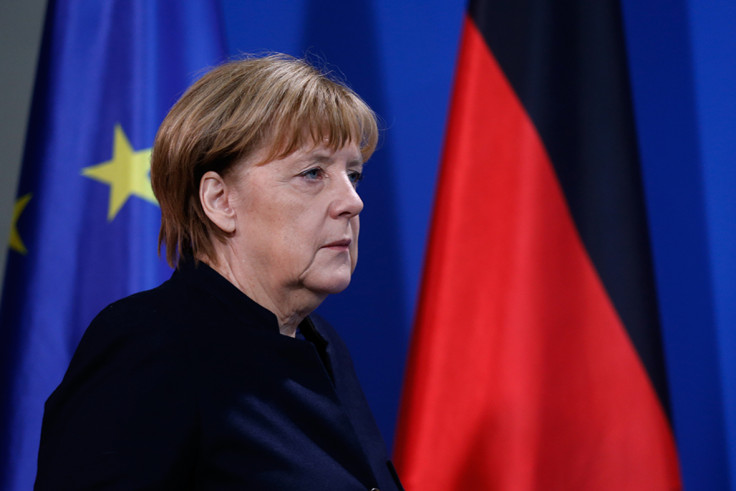The Berlin attack could undo Angela Merkel's humanitarianism in Germany
Political parties could use this to embolden the idea that there's a link between refugees and terrorism.
On Monday night, an articulated lorry drove into a popular Christmas market in West Berlin, killing 12 people and injuring almost fifty others. The German police are now on a manhunt for a young Tunisian man in connection with the attack, who had been under surveillance for some time in the autumn and whom the German authorities tried to deport to Tunisia.
This is pretty much all we know for sure at the moment. We also know that the German police and intelligence communities assume that this was a deliberate terror attack. Islamic State only recently published a guide about how to carry out such attacks.
The symbolism of what happened could not be stronger: not only because of Christmas, but also because of Christmas markets as markers of German Gemütlichkeit, the feeling of warmth and community, and festivity.
This is, of course, not the first attack that could be linked to Islamic terror activities over the course of last year. It carries a strong superficial resemblance to what happened in Nice in July.
Those cosy feelings around Christmas have now been broken. And the question for the coming months and years will be whether the communities that have supported and carried them will also break because of events such as this one.
So far, in general in comparison to some of the hysterical headlines in British papers, the German media and general public have reacted relatively calmly to the attacks. They did not speculate, and they are not stoking up tensions. The German government has chosen its now classic line of approach, an approach that suits Chancellor Angela Merkel's leadership style: they have put the relevant measures in place and have reacted coolly. Merkel visited the scene on Tuesday afternoon.
But something is different this time: this is the first terror attack where it seems clear already that the attacker was not a loner, and where the attack required more sophisticated planning, including what looks like the theft of a Polish lorry and the possible shooting of its driver.
This is also the first attack where it appears (although we don't know the full story yet) that the attacker had only recently arrived in Germany as an asylum seeker, and was potentially one of the almost a million refugees who entered Germany after the German government had decided to open the borders for a short period of time.
The attack follows only shortly after the debate about the rape of a girl in Freiburg by an asylum seeker, who already had a relevant record in Greece – a debate where the German media received substantial criticism for not reporting fully on what had happened.
Accordingly, members of the right-wing Alternative for Germany (Afd) party have reacted even more polemically than usual. AfD politician Marcus Pretzell tweeted as soon as news about a possible terror attack broke: 'these are Merkel's dead'. The word '#terror chancellor' as a description for Merkel developed quite some traction on Twitter.

Such labels – and accusations of treason against Merkel – have been quite common in right-wing circles around the AfD. But they have now reached more mainstream circles and are becoming more acceptable to be voiced in public. Horst Seehofer, leader of the CDU's Bavarian sister party CSU and always keen to appear in line with the popular mood, has already said that "it was owed to the victims of the attack to look at changing refugee policies."
Sociologists have coined the phrase "critical events". This attack could be such an event, an event that changes fundamentally the framework of discussions. It could turn out to be this event that exposes some of the sentiments that have so far been voiced by many in hushed voices and underground, over a beer at the pub. They have, until Monday, not had a real effect on the CDU's and Merkel's poll ratings – and have not increased the AfD's popularity beyond 15% or so.
This attack could change this and establish the idea that there is a direct link between refugees and Islamic terrorism more firmly in the political mainstream. This matters especially because of the forthcoming elections in Saarland, Schleswig-Holstein and the important North Rhine-Westphalia and then for the federal elections in late summer 2017. The question will be whether the Social Democrats and the Christian Democrats will feel the need to respond directly to this by incorporating some of these views into their platforms.
There is also the broader issue of how Germans perceive the ability of the state to protect them. It will be interesting to see whether the German government will bring in some new anti-terror measures, or sharpens existing ones, that are especially focused on asylum seekers. The recent news about the Tunisian asylum seeker has already led to a debate about whether the German security services are up to their job, and whether a root-and-branch reform of the highly fragmented system might be required.
Unlike after previous attacks, Merkel has already acknowledged that some terrorists might abuse Germany's humanitarian stance for their own ends. This could turn out to be a bold gesture, trying to lead public opinion and highlight the complexity of the world in which we live. But it could also turn into evidence of the undoing of what has been a remarkably strong consensus around humanitarianism and liberal pluralism in German political culture. At the moment, it is still too early to tell.
Professor Holger Nehring is Chair in Contemporary European History at the University of Stirling
© Copyright IBTimes 2025. All rights reserved.






















